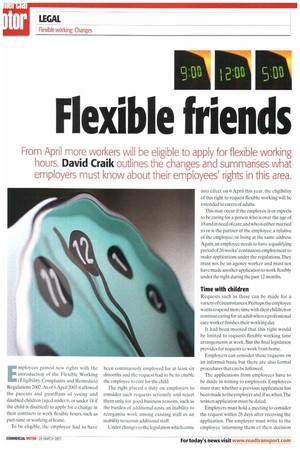Flexible friends
Page 38

Page 39

If you've noticed an error in this article please click here to report it so we can fix it.
From April more workers will be eligible to apply for flexible working
hours. David Craik outlines the changes and summarises what employers must know about their employees' rights in this area.
Employees gained new rights with the introduction of the Flexible Working (Eligibility, Complaints and Remedies) Regulations 2002. As of 6 April 2003 it allowed the parents and guardians of young and disabled children (aged under 6, or under 18 if the child is disabled) to apply for a change in their contracts to work flexible hours, such as part-time or working at home.
To be eligible, the employee had to have been continuously employed for at least six dmoriths and the request had to be to enable the employee to care for the child.
The right placed a duty on employers to consider such requests seriously and reject them only for good business reasons, such as the burden of additional costs, an inability to reorganise work among existing staff or an inability to recruit additional staff.
Under changes to the legislation which come into effect on 6 April this year, the eligibility of this right to request flexible working will be extended to carers of adults.
This may occur if the employee is or expects to be caring for a person who is over the age of 18 and in need of care,and who is either married to or is the partner of the employee; a relative of the employee: or living at the same address. Again, an employee needs to have a qualifying period of 26 weeks' continuous employment to make applications under the regulations. They must not be an agency worker and must not have made another application to work flexibly under the right during the past 12 months.
Time with children Requests such as these can be made for a variety of circumstances. Perhaps the employee wants to spend more time with their children or continue caring for an adult when a professional care worker finishes their working day It had been mooted that this right would be limited to requests flexible working time arrangements at work. But the final legislation provides for requests to work from home.
Employers can consider these requests on an informal basis, but there are also formal procedures that can be followed.
The applications from employees have to be made in writing to employers. Employees must state whether a previous application has been made to the employer and, if so,when.The written application must be dated.
Employers must hold a meeting to consider the request within 28 days after receiving the application. The employer must write to the employee informing them of their decision within 14 days after the date of the meeting.
The process can take up to 14 weeks and during this time the employer must provide the employee with appropriate support and information. If the employer agrees to the request, it will result in a permanent change to the employees' contract of employment.
An employer can lawfully refuse a request hut must provide a written explanation. The employee can then apply to an Employment Tribunal for compensation and/or an order that the employer reconsider its refusal. The maximum amount of compensation a Tribunal may award is eight weeks' pay. The employee is protected from detriment or dismissal for making an application.
If a dispute arises over a request for flexible working and cannot be settled amicably, a Tribunal can be avoided by making use of a special ACAS arbitration scheme, subject to the agreement of both parties. • • FURTHER INFORMATION www.acas.org.uk www.dti.gov.uk
























































































































































































